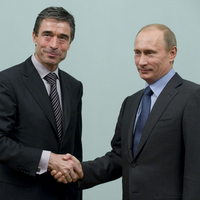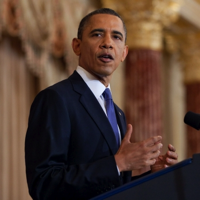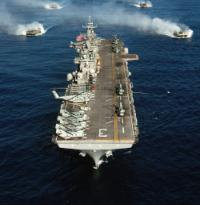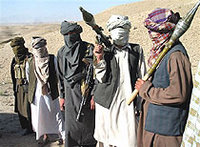Ukraine is moving to liberalize its land market, but, according to recent statements by the country’s agriculture minister, foreigners will be prohibited from purchasing agricultural land. In an email interview, Leo A. Krasnozhon, a visiting assistant professor of economics at the University of Texas at Arlington, discussed Ukraine’s agricultural land policies. WPR: What is the extent of Ukraine’s agricultural trade, and who are its major trading partners? Leo A. Krasnozhon: Agricultural trade plays a very important role in Ukraine’s economy. Ukraine is one of the top world exporters of grain, which generates 15 percent of the country’s exports, or $7.5 […]
Latest Archive
Free Newsletter
This week marks the first anniversary of the seemingly spontaneous ethnic violence that drew the world’s attention to Kyrgyzstan for several weeks last June and ultimately left more than 400 dead. But while Western attention has long since waned, the antipathy between the country’s Kyrgyz majority and its Uzbek minority has not. A year after the fighting between them first broke out in the city of Osh, Kyrgyzstan is nowhere near achieving reconciliation between the two groups; rather, it is in the eye of the storm. Although last year’s violence reached its greatest intensity in the southern cities of Osh […]

The Western press is rife with stories about China’s growing conservatism, reflected by an ongoing crackdown on free speech by Chinese authorities as well as a Maoist revival in the interior provinces. In our alarm, we imagine the worst of all possible outcomes: an all-powerful Chinese economy lorded over by a political system that somehow reverts to its communist-era politics of open antagonism with the West. While there are powerful structural dynamics that work against this combination, we should nonetheless not fear it. To the extent that China’s economic trajectory is threatening to stall out, as it inevitably must at […]

Chinese foreign investment is often considered nonideological: Dictatorship or democracy, model state or pariah — if a country has natural resources, China is an eager investor. In Latin America the characterization rings true, as China has curried favor with left-leaning governments — in Venezuela and Ecuador — and right-leaning governments — in Chile and Colombia — alike. China’s relations with Cuba are a case in point, if a counterintuitive one. On a three-day visit to the island this week, Chinese Vice President Xi Jinping and Cuban President Raúl Castro signed 10 accords and began talks on a five-year plan for […]

The Naval War College just completed its annual Current Strategy Forum, with this year’s topic being “Energy and U.S. National Security: Vulnerability and Opportunity.” Listening to the presentations, one could not help but be struck by the “chicken and egg” relationship between access to energy and U.S. grand strategy. Which should drive the other — and what are the various options? Rising energy costs, combined with economic austerity, means that “business as usual” is no longer an option for the U.S. military. A recent study by Deloitte noted (.pdf), “Warfare and combat operations are not the only variables driving [Defense […]

Last week’s announcement by Pentagon officials that cyberattacks could be classified as acts of war caused concern among those who worry that the United States might act outside international law if it retaliates to such attacks with military force. Others assert the move amounts to little more than a money grab by budget-savvy advocates looking to foment fear and exploit public ignorance. But many cybersecurity experts say the policy statement is merely the latest step in a strategy that President Barack Obama began developing two years ago. And, they say, it might act as a deterrent to would-be U.S. enemies. […]
With the turmoil in North Africa impacting Turkey’s primary commercial ties with the continent, Turkish exports to sub-Saharan Africa have grown sharply this year. In an email interview, Thomas Wheeler, a longtime South African diplomat and researcher at the South African Institute for International Affairs, discussed Turkey-Africa relations. WPR: What is the history of Turkey’s trade and diplomatic relations with sub-Saharan Africa? Thomas Wheeler: Turkey had few relations with sub-Saharan Africa until the 1990s. Admittedly, the Ottoman sultan appointed honorary consuls in South Africa in the 19th century, but during the Republican era from 1922, Ankara’s emphasis was on consolidating […]

During the Cold War, the U.S. installed 7,000 nuclear weapons in Europe because of the perceived military imbalance in favor of the Soviet Union. European governments, unlike their publics, accepted them with the understanding that free riding in a military alliance had its limits. But these tactical nuclear weapons, some of them much more powerful than the Hiroshima bomb, led to regular friction within NATO. Since the implosion of the USSR and the Warsaw Pact, more than 90 percent of these weapons have been withdrawn, silently and unilaterally or in a reciprocal way. Today, a total of 200 weapons remain […]
The West Africa Cable System recently landed in Ghana, extending the reach of the new undersea telecommunications cable that will eventually run from South Africa to Western Europe. In an email interview, Patricia K. McCormick, an expert in developing-country telecommunications policy at Wayne State University, discussed Africa’s telecommunications infrastructure. WPR: What is the current state of Africa’s telecommunications infrastructure? Patricia K. McCormick: If the wealth and socio-economic health of a region is defined by its ability to participate in the networked economy, Africa is indeed impoverished. In an era of accelerated technological change, Africa’s technological dependency and underdevelopment impairs its […]

Coverage of last month’s Group of Eight summit in Deauville, France, centered on the leadership crisis at the International Monetary Fund and measures to support new regimes in the Arab world. However, the summit’s most significant achievement may be the dramatic change in Russia’s stance on the conflict in Libya. After months of Russian ambivalence toward the military intervention against Col. Moammar Gadhafi, Russian President Dmitry Medvedev not only joined the other G-8 leaders in a statement declaring that Gadhafi has lost all legitimacy and must step down, but also announced that Russia would help mediate an exit for the […]

When President Barack Obama took the podium at the State Department to outline Washington’s new policy framework for the Middle East several weeks ago, he unleashed a storm of controversy that caught many people by surprise. The speech sought to outline a new American stance toward the unfolding changes in the Arab world. But the controversy centered instead on the president’s statement regarding the decades-old conflict between Israelis and Palestinians. When Obama called for a return to negotiations “based on the 1967 lines with mutually agreed swaps,” he sparked a furious, if rather unusual dispute. On one side, the president’s […]
The defeat of Portugal’s Socialist Party in parliamentary elections last Sunday was largely reported as an indictment of the welfare state and spending policies embraced by the party and outgoing Prime Minister José Sócrates. However, Robert M. Fishman, a sociologist at the University of Notre Damewhose research focuseson the politics of Portugal and Spain, says the victorious Social Democrat Party (PSD) is unlikely to bring about the sort of significant rightward shift in policies heralded in much of the media coverage of the elections. “Historically the PSD has defended and enacted policies that are not hostile to the welfare state […]
U.S. Defense Secretary Robert Gates’ visit to Afghanistan this week prompted contradictory reports about both the war’s progress and the likelihood for an accelerated troop withdrawal. Some observers said President Barack Obama’s security team was now considering the option of a swift pullout. Others quoted Gates as saying it’s too early to end combat. Meanwhile, a U.S. general touted success in training Afghan forces just as Congress released a report criticizing the Afghan nation-building program. Joshua Foust, a fellow and Afghanistan specialist with the American Security Project, tells Trend Lines that the conflicting reports are best explained by a widening […]

Defense budget advocacy can be a dry business. While debating the technical aspects of some weapon or another is boring enough to a lay audience, arguing the finer points of industrial policy can put all but the most dedicated bureaucrats — and lobbyists — to sleep. Accordingly, defense policy advocates often rely on scare stories designed to shock and awe, winning an audience’s attention and credulity with dramatic claims of horrific outcomes should the wrong path be taken. If the story succeeds in creating the desired effect, no one realizes until too late that it was all a sham. Perhaps […]

In recent weeks Taliban fighters have been handing over their weapons in record numbers in Afghanistan. This spike in the defection rate, perhaps motivated by Osama bin Laden’s death, has opened an important window of opportunity for U.S. and NATO forces fighting there. But so far the West has not been able to capitalize on this surge in Taliban defections effectively. In fact, in some cases, those interested in abandoning the insurgency and joining the government’s side are even being turned away. The failure to prioritize and generously fund defection and reintegration programs in Afghanistan poses a threat to the […]
